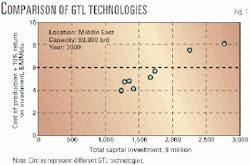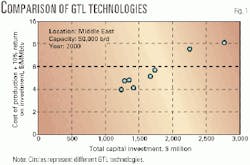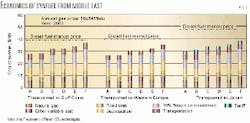Stranded-gas study sees good future for synfuels
The use of low-cost, stranded-gas reserves for production of synthetic fuels (synfuels) and chemicals will be an economic alternative to conventional fuels and chemicals, says Chem Systems, White Plains, NY, in its recent stranded-gas-utilization study.
The most promising scenarios involve manufacturing the products at a remote Middle East location and shipping them to such markets as the US Gulf Coast (USGC), Western Europe, and Japan.
There are about 5,000 tcf of proven natural gas reserves in the world. Eastern Europe and the Middle East together account for more than 70% of these reserves. Almost 60% of global proven reserves are remote or stranded.
The consulting firm evaluated several technologies, including gas-to-liquids (GTL), methanol-to-gasoline (MTG), methanol-to-olefins (MTO), olefins-to-gasoline and distillates (MOGD), dimethyl ether (DME) processes, large-scale methanol processes, and power generation from methanol.
GTL economics
The commercially proven technologies for production of middle distillates via GTL processes show a great potential for fuel alternatives and higher value products. The technologies are in various stages of development.
Fig. 1 compares various GTL technologies, which use Fischer Tropsch synthesis of natural gas, mapped out by cost of production and capital investment. These technologies include those of Conoco Inc., Houston; ExxonMobil Corp., Irving; Rentech Inc., Denver; Sasol, Johannesburg; Shell International Ltd., London; and Syntroleum Corp., Tulsa.
Fig. 1 also plots ExxonMobil's MTG and MOGD processes for comparison. The technologies that require lower capital investments are the most viable ones to date.
Fig. 2 compares the margins on GTL-produced synfuels from the Middle East and transported to the USGC, Western Europe, and Japan. Highest margins are for synfuels destined for Japan.
Other economics
Technology to produce DME, a diesel substitute, has not been competitive with conventional diesel fuel processes. The properties of DME exceed most stringent and proposed engine-emissions regulations while affording excellent diesel properties and a high cetane number.
Production of DME via the emerging one-step processes, proposed by companies such as Haldor Tops e AS, Lyngby, Denmark, and Air Products & Chemicals Inc., Lehigh Valley, Pa., is not yet competitive with DME produced via the conventional two-step approach (natural gas to methanol, then methanol to DME).
The economics of both technologies appear to be marginally competitive with diesel fuel market prices in Europe and Japan but less so in the US.
Chem Systems does not expect production of gasoline and gasoline mixtures via MTG and MOGD to be economically competitive with conventional petroleum technologies.
The MTG process was developed by Mobil Corp., now ExxonMobil, in its New Zealand plant in 1985. Methanex now owns the plant. Haldor Tops e has since developed TIGAS, an integrated gasoline synthesis process, in an effort to improve MTG economics.
The export of polypropylene produced in an integrated methanol-to-propylene (MTP) and propylene-to-polypropylene complex in the Middle East can be competitive with USGC and Western Europe locally produced polypropylene. This would be done with MTO technology, which can produce mixtures of ethylene and propylene of various ratios, primarily propylene, depending on the process.
Commercially viable MTO processes include those developed by UOP LLC and Norsk Hydro (the UOP Hydro MTO process) and ExxonMobil (ExxonMobil MTO process).
The production of ammonia from remote natural gas, as measured by the delivered cost of urea produced from an integrated ammonia-urea complex in the Middle East, is not generally competitive with the respective local market prices for urea, said the consulting firm.
Finally, the generation of power from methanol produced from large-scale methanol plants is not projected to be competitive with technologies to produce power from natural gas in the USGC. It will be competitive, however, with power produced from LNG.
In 1999, Foster Wheeler Corp., Clinton, NJ, announced an exclusive licensing agreement with Starchem Technologies Inc., Houston, to commercialize a large-scale production technology of methanol from remote natural gas for use as fuel in some combined-cycle power plants.
Fuel-grade methanol can be transported safely at low cost to distant markets. This is especially beneficial for plants located in regions where pipeline natural gas is not available or where power demand is too small for LNG to be practical.


